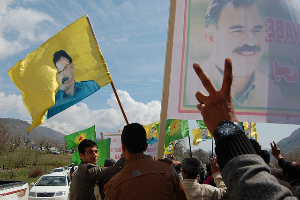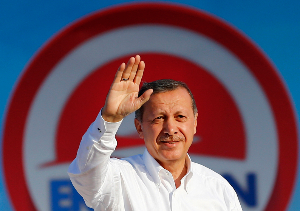The HDP's Election Gambit and Turkey's Tolling Alarm Bells
By Gareth Jenkins (vol. 8, no. 2 of the Turkey Analyst)
On January 13, 2015, Selahattin Demirtaş, the co-chair of the pro-Kurdish Peoples’ Democratic Party (HDP), announced that the HDP will run as a party in the June 7, 2015 general election. If the HDP fails to cross the 10 per cent national electoral threshold not only will the country’s Kurds no longer have their own voice in parliament but nearly all of the seats in predominantly Kurdish areas are likely to go to the ruling Justice and Development Party (AKP), thus boosting President Recep Tayyip Erdoğan’s hopes of changing the constitution and introducing a presidential or semi-presidential system.

The Kurdish Nationalist Movement and the Dialogue with Öcalan
By Gareth Jenkins (vol. 7, no. 22 of the Turkey Analyst)
On November 29, 2014, Abdullah Öcalan, the imprisoned founder of the Kurdistan Workers’ Party (PKK) told a visiting delegation from the pro-Kurdish Peoples’ Democratic Party (HDP) that the Kurdish issue could be resolved – and the PKK’s 30 year-old insurgency ended – within four to five months provided that the ruling Justice and Development Party (AKP) took the appropriate measures. In reality, not only is there little prospect of breakthrough but frustration at the lack of progress has begun to highlight the struggle for relevance between different elements within the Kurdish nationalist movement.

What the Columnists Say
Two topics dominate the comments after Turkey’s presidential election: the strong showing of Selahattin Demirtaş, the Kurdish candidate, who succeeded in appealing to a broader electorate, and who is generally seen as the real star of the election; and the failure of Ekmeleddin İhsanoğlu, the lackluster joint candidate of the opposition parties CHP and MHP. Liberal and social democratic commentators see Demirtaş’ success as heralding the birth of a new left. These commentators stress that the CHP needs to heed the call of this new left and warn that the party is doomed if it persists in allying itself with the rightist MHP. Meanwhile, the public rift within the AKP between the supporters of president-elect Recep Tayyip Erdoğan and the outgoing president Abdullah Gül has led many commentators to speculate about the future of the AKP. The prediction is made that Turkey’s course will be determined by the outcome of the intra-AKP struggle.
Turkey's Presidential Election: The Clouds on Erdogan's Horizon
By Gareth Jenkins (vol. 7, no. 14 of the Turkey Analyst)
Despite his convincing victory in the presidential elections on August 10, 2014, there appears little prospect of Prime Minister Recep Tayyip Erdoğan being able to replace Turkey’s parliamentary system with a presidential one and ruling the country singlehandedly for two successive five-year terms.







